Mastering Turkey on the Grill: Techniques & Recipes

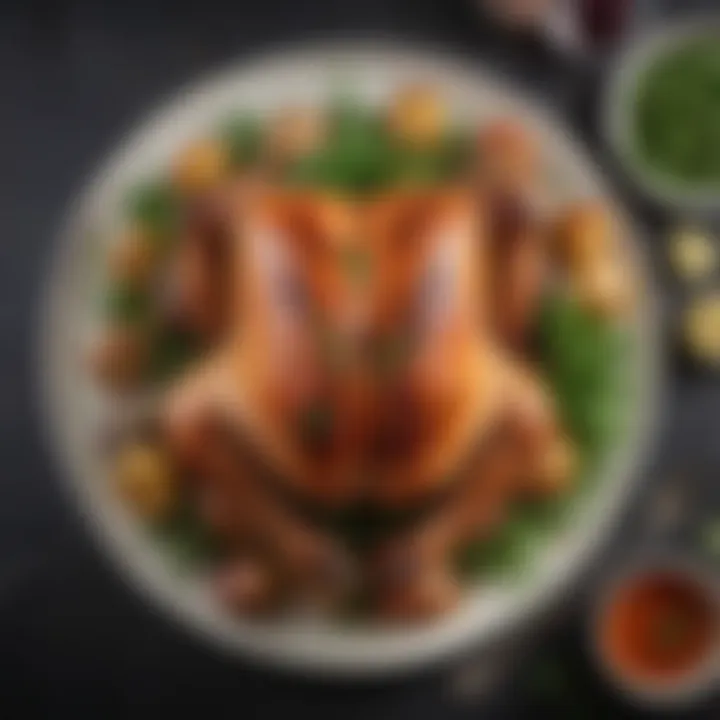
Intro
Grilling turkey may seem intimidating, yet it offers a unique flavor and texture that traditional cooking methods cannot replicate. This process not only enhances the natural taste of the turkey but also brings a smoky aroma that many find appealing. Understanding the fundamentals of grilling turkey is essential for success. Each step, from preparation to serving, requires careful consideration and technique. In this guide, we explore various methods, provide recipes, and list essential tips to help both novice and experienced cooks create a delicious grilled turkey.
Recipe Overview
Recipe Name
Grilled Herb Turkey
Brief Description of the Dish
This dish features turkey marinated in a blend of fresh herbs, garlic, and citrus, grilled to perfection. The result is a moist and flavorful turkey, ideal for summer barbecues or festive gatherings. Using a grill imparts a distinct taste that elevates the dining experience, making it memorable.
Ingredients List
Main Ingredients
- Whole turkey (12-14 pounds)
- Olive oil (1/2 cup)
- Fresh rosemary (1/4 cup, chopped)
- Fresh thyme (1/4 cup, chopped)
- Garlic (6 cloves, minced)
- Lemon (2, juiced)
- Salt (2 tablespoons)
- Black pepper (1 tablespoon)
Optional Ingredients
- Other herbs (such as sage or parsley)
- Spices (like paprika or cayenne pepper)
- Butter (for basting)
Choosing the right ingredients is crucial as they will enhance the flavor of the turkey. Fresh herbs are preferred for the best taste, while optional ingredients allow for personalization.
Proper seasoning is key to achieving a flavorful grilled turkey. Experiment with different herbs and spices to find the combination that suits your palate.
Preface to Grilling Turkey
Grilling turkey offers a unique experience that many cooks may overlook. The method of grilling transforms this classic poultry into a tender, smoky delight that can please any palate. This section aims to outline the importance of grilling turkey within the wider culinary landscape, detailing its benefits and considerations. By embracing the art of grilled turkey, individuals can expand their cooking repertoire, enjoy healthier options, and create unforgettable meals.
Understanding the Appeal of Grilled Turkey
Grilled turkey distinguishes itself from other cooking methods with its appealing texture and flavor. The high heat of grilling allows for a fabulous crisp skin while keeping the inside juicy and moist. Additionally, the versatility in flavorings—from marinades to rubs—enables cooks to experiment significantly with different cuisines. This technique promotes outdoor cooking, which often enhances the enjoyment of communal meals. Many find that the smoky aroma and slight char from the grill add depth, elevating turkey from a holiday staple to a year-round star.
Historical Context of Grilling Turkey
The origins of grilling turkey can be traced back to the traditions of various cultures, typically around festive occasions. While grilling meats has long been a practice throughout history, turkey became prominent in American cooking during the Thanksgiving celebrations. Over the years, as culinary techniques evolved, grilling emerged as a favored method, especially in the southern United States. Here, families gather outdoors, celebrating with barbecues and grills, bringing a rich heritage into the modern era. Each grilling session reconnects individuals to centuries of cooking traditions, fostering a sense of community and shared enjoyment.
Grilling turkey is not just about the food; it holds deep cultural significance that makes it appealing for diverse gatherings.
Choosing the Right Turkey
Choosing the right turkey is a fundamental step in the grilling process. This decision can directly influence the flavor, texture, and overall experience of your grilled turkey. The right bird sets the stage for delicious outcomes, ensuring the cooking techniques applied yield the best results. Understanding your options is critical, as it allows you to select a turkey that meets your specific needs.
Selecting Fresh vs. Frozen Turkey
When confronted with the choice between fresh and frozen turkey, it’s essential to consider several factors.
- Flavor and texture: Fresh turkeys, generally a better choice, provide richer flavors and improved texture. These birds have not been subjected to the freezing process, which can sometimes alter the meat’s integrity.
- Availability: Fresh turkeys tend to be more widely available around holidays. However, frozen turkeys offer convenience, as they can be purchased well in advance and stored in your freezer until you are ready to grill.
- Thawing time: If you opt for a frozen turkey, ensure you plan ahead. Thawing a turkey can take time; generally, allow 24 hours for every four to five pounds of turkey in the refrigerator.
"Selecting the right bird is the foundation of a successful grilling experience. It's not just about cooking; it's about creating memorable meals."
- Cost: Often, fresh turkeys are more expensive than their frozen counterparts. Assess your budget and weigh the importance of quality versus cost.
Ultimately, the choice between fresh and frozen turkey depends on personal preferences and circumstances.
Understanding Turkey Sizes and Weights
Knowing the sizes and weights of turkeys is critical for several reasons. First, it affects the amount of meat available, which is an important consideration for gatherings.
- Determining serving sizes: As a rule of thumb, plan on about 1 to 1.5 pounds of turkey per person. Larger gatherings may allow for smaller servings, but having extra for leftovers is often welcomed.
- Cooking time: The size of the turkey also directly impacts cooking time. Larger turkeys require more time on the grill, which can affect your planning and meal timing.
- Types of brands or breeds: Different breeds may affect flavor and texture, influencing your choice. Popular breeds like the Broad Breasted White provide more meat, while heritage breeds offer unique flavors but might be smaller.
In summary, whether you choose fresh or frozen, and understanding the weight and size of turkey will prepare you for a more successful cooking experience. This planning reinforces your approach to grilling turkey, ultimately enhancing the overall culinary adventure.
Essential Grilling Equipment
Grilling turkey requires more than just skill; it demands the right equipment for optimal results. The choice and quality of essential grilling equipment can significantly impact the flavor and texture of the turkey. Understanding these tools helps in making informed decisions, ensuring a successful grilling experience.
Types of Grills: Gas vs. Charcoal
When it comes to grilling, the type of grill plays a crucial role. Gas grills offer convenience and ease of use. They heat up quickly and allow for precise temperature control. This can be beneficial when cooking turkey, keeping it juicy and perfectly cooked. However, gas grills may not provide the same depth of flavor as charcoal grills.
Charcoal grills, on the other hand, are favored for their ability to impart a smoky flavor that enhances the turkey's natural taste. Though they take longer to heat and require more effort to manage temperature, many chefs appreciate the distinctive char that charcoal grilling offers. Each type has its benefits, and the choice will depend on personal preference and the desired outcome.
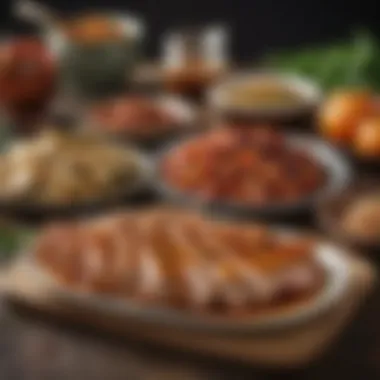
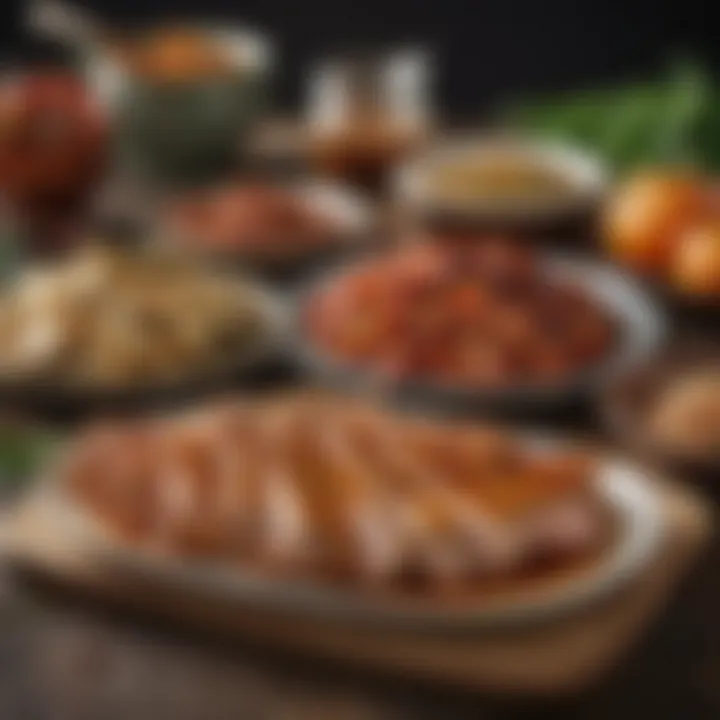
Necessary Tools and Accessories
Having the right tools and accessories can turn the grilling process into a streamlined operation. Here are some indispensable items:
- Grilling Tools: A basic toolkit, including a sturdy spatula, tongs, and a basting brush, is essential for handling the turkey with care.
- Meat Thermometer: This tool is crucial for determining the doneness of the turkey. It ensures that the meat reaches a safe internal temperature, which prevents undercooking.
- Grill Brush: Maintaining a clean grill is vital for safety and flavor. A good grill brush will help remove residues and make cleaning an easier task.
- Aluminum Foil: This is useful for making a tent over the turkey when it reaches a certain temperature, helping to keep it moist throughout the cooking process.
- Drip Pan: Placing a drip pan under the turkey can catch juices that can later be used to make gravy, adding another layer of flavor to the meal.
Investing in these tools not only enhances the grilling experience but also contributes to the quality of the final dish. Proper equipment is a necessary aspect of cooking, and taking time to select the right items improves the overall outcome.
Preparing the Turkey for Grilling
Preparing the turkey adequately is a crucial step in ensuring a successful grilling experience. The quality of the final dish largely depends on how well the turkey has been prepared before it even touches the grill. Proper preparation not only enhances flavor but also helps to achieve a juicy and tender result. In this section, we will focus on thawing techniques, brining methods, and the use of marinades or rubs. Each aspect plays a significant role in enhancing the turkey's flavor and texture, leading to a more enjoyable meal.
Thawing Techniques for Frozen Turkey
Thawing a frozen turkey correctly is essential to avoid food safety risks and ensure even cooking. There are several methods to thaw turkey, each with its advantages.
- Refrigerator Thawing: This is the safest method. Place the frozen turkey in the refrigerator, allowing approximately 24 hours of thawing time for every five pounds of turkey. This slow process keeps the turkey at a safe temperature.
- Cold Water Thawing: For those in need of a quicker option, submerge the turkey in cold water, changing the water every 30 minutes. This method takes about 30 minutes per pound.
- Microwave Thawing: If time is very limited, use the microwave. Follow the microwave's instructions for incorrect defrosting. However, it may partially cook the turkey, which could affect cooking later on.
It's important to never thaw turkey at room temperature, as this allows harmful bacteria to thrive.
Brining for Enhanced Flavor
Brining is a technique used to infuse flavor and moisture into turkey. The process involves soaking the turkey in a saltwater solution, which helps the meat retain moisture during cooking. As a result, grilled turkey comes out juicy and flavorful. Here are some brining tips:
- Basic Brine Recipe: Dissolve half a cup of salt in a quart of water. You can add sugar, herbs, or spices for additional flavor. A common mix involves garlic, thyme, and bay leaves.
- Brining Duration: A turkey should be brined for at least 12 hours but can benefit from more. Avoid exceeding 24 hours to prevent overly salty meat.
- Drying: After brining, rinse the turkey under cool water and pat it dry. This step helps to develop a crispy skin when grilled.
Marinades and Rubs: Enhancing Flavor Profiles
Marinades and rubs provide another avenue for flavor customization. Marinades typically consist of acidic components, such as vinegar or citrus juice, combined with seasonings. Rubs are dry mixtures applied directly onto the turkey skin.
- Marinade Tips: When marinating, aim for a balance of acid, fat, and spices. For instance, a marinade can include olive oil, lemon juice, garlic, and rosemary. Marinate for several hours or overnight in the refrigerator for best results.
- Rubs: Create a rub by mixing salt, pepper, paprika, garlic powder, and any other desired spices. Apply the rub generously and allow the turkey to sit for at least an hour before grilling. Rubs deliver intense flavor to the turkey’s outer layer.
By utilizing these preparation methods, you lay a solid foundation for a delicious grilled turkey. Each step contributes to ensuring that the turkey retains its moisture and flavor, leading to a successful grilling outcome.
Grilling Techniques
Grilling techniques are fundamental to achieving a well-cooked turkey. Mastery of these methods influences not only the flavor and texture of the meat but also ensures food safety and enjoyment for your guests. Proper techniques can elevate a simple turkey into a remarkable culinary experience.
Direct vs. Indirect Grilling
When it comes to grilling turkey, understanding the difference between direct and indirect grilling is crucial. Direct grilling involves cooking food directly over the heat source. It is most effective for small cuts of meat, allowing for a quick sear and caramelization of the exterior. However, for a whole turkey, direct grilling can lead to burnt skin and an undercooked interior.
Indirect grilling, on the other hand, uses a two-zone fire setup. One side of the grill is heated, while the other remains cooler. This allows for a slow and steady cooking process. The turkey does not sit directly over the flames, resulting in a more evenly cooked bird. This method is essential for larger turkeys, as it helps preserve moisture and avoid charring.
In essence, if you want a perfect grilled turkey, indirect grilling is the way to go. It is advisable to start with direct grilling for a few minutes to achieve browning, then shift to indirect grilling to finish cooking it through.
Maintaining Proper Temperature Control
Temperature control is vital for grilling turkey. Cooking at the right temperature ensures that the meat is safe to eat and remains juicy. A range of 325°F to 350°F is typically recommended for grilling turkey indirectly.
Here are several tips to help maintain proper temperature:
- Preheat the grill: Always allow your grill to heat before placing the turkey on it. A well-preheated grill helps in starting the cooking process effectively.
- Use a Meat Thermometer: A good quality meat thermometer is an indispensable tool. Insert it into the thickest part of the turkey, avoiding bones, to accurately measure doneness. Turkey should reach an internal temperature of 165°F.
- Monitor Grill Temperature: Check the grill temperature regularly. If it drops too low, add more fuel or adjust the vents on a charcoal grill to increase airflow.
A steady temperature will yield a turkey that is both safe to eat and deliciously moist. To conclude, mastering grilling techniques, particularly understanding direct versus indirect grilling, alongside maintaining proper temperature control are essential for an exceptional grilling experience.
Cooking Times for Grilled Turkey
Understanding the cooking times for grilled turkey is crucial for achieving a perfectly cooked dish. Cooking times influence not only the texture and flavor of the turkey but also food safety. Undercooking might lead to potential health risks while overcooking will result in dry meat. Thus, it’s essential to have a good grasp of how long to grill your turkey based on its size and weight.
Cooking turkey requires careful consideration of various factors including the grill temperature, whether the turkey is stuffed or unstuffed, and the specific grill type being used. Getting these elements right will ensure that your turkey is both safe to eat and delicious. In this section, we will explore how to estimate cooking time per pound and the effective use of a meat thermometer to ensure perfect results every time.
Estimating Cooking Time per Pound
Estimating cooking time for grilled turkey generally follows a ratio of approximately 13 to 15 minutes per pound at a consistent grilling temperature of around 350 degrees Fahrenheit. This guideline is useful for achieving optimal results:
- For a 10-pound turkey, expect about 2.5 to 2.75 hours of grilling time.
- For a 12-pound turkey, aim for around 2.75 to 3 hours.
- A larger 14-pound turkey may take between 3 to 3.5 hours.
It is important to note that these are rough estimates; the actual cooking time may vary slightly due to individual grill characteristics and environmental conditions. A well-calibrated grill and consistent temperature can notably help in reaching the desired cooking time with accuracy.
Also, if you plan to stuff your turkey, consider that stuffed turkeys take longer to cook compared to unstuffed turkeys. In fact, the stuffing must reach a minimum temperature of 165 degrees Fahrenheit for safety.
Using a Meat Thermometer Effectively
The meat thermometer is an indispensable tool for grilling turkey. Its proper use can ensure that the turkey is cooked just right—juicy, tender, and free from safety concerns. A digital meat thermometer offers the best accuracy; however, analog types are also effective if used correctly.
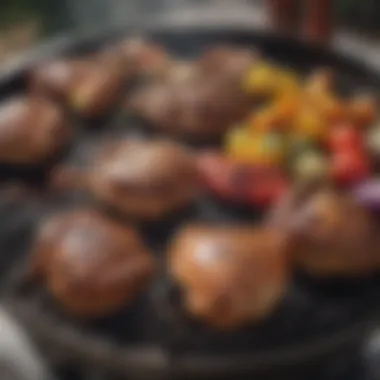
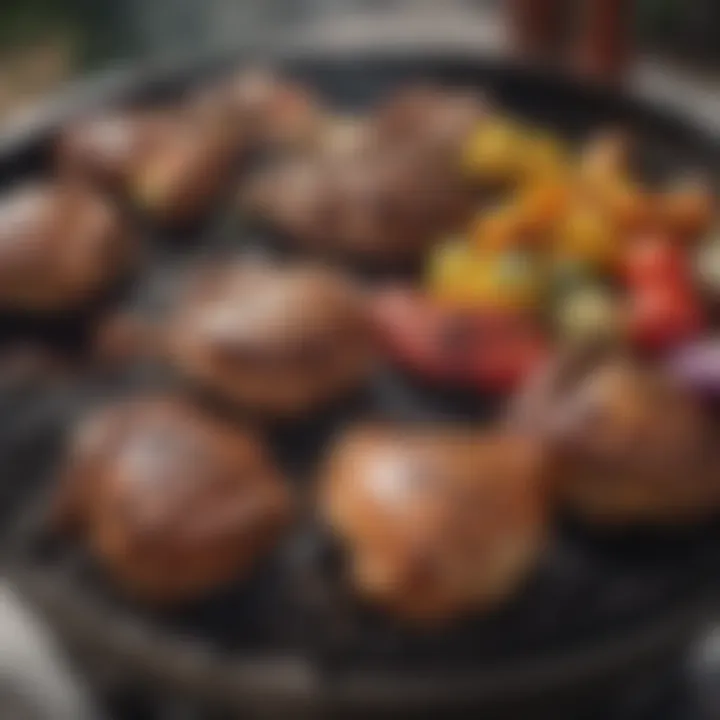
To use a meat thermometer effectively, follow these steps:
- Insert the Probe: Place the thermometer's probe deep into the thickest part of the turkey, taking care not to touch bone, as this can give a misleading reading.
- Check the Temperature: The USDA recommends that turkey must reach an internal temperature of 165 degrees Fahrenheit for safe consumption.
- Perform Multiple Checks: Be sure to check in a few places like the breast and thigh compared to the stuffing if applicable.
Meat thermometers not only prevent undercooking and potential foodborne illness but also assist in avoiding overcooking. The turkey continues to cook for some time even after being removed from the grill due to residual heat, so removing it once it reaches 160 degrees Fahrenheit can allow for a perfect finish without drying out.
Using these simple yet effective methods will significantly enhance the quality and safety of your grilled turkey.
Common Grilling Issues and Solutions
Understanding common grilling issues is essential for anyone aiming to achieve deliciously grilled turkey. Grilling is both an art and a science. Missteps can easily lead to undesirable outcomes. Addressing these issues proactively helps to enhance the flavor and texture of grilled turkey, ensuring a more satisfying culinary experience.
Avoiding Dry Turkey: Troubleshooting Tips
Grilled turkey can often turn out dry if not properly handled. The following strategies can help prevent dryness:
- Brining: Soaking the turkey in a saltwater solution before grilling enhances moisture retention. This is crucial, especially for larger birds.
- Use of Marinades: A good marinade adds flavor and moisture. Consider options rich in oil, such as olive oil-based marinades, which protect the meat during grilling.
- Temperature Control: Maintaining a consistent grilling temperature allows for even cooking. Avoid high temperatures that contribute to quicker moisture loss.
Pro Tip: A meat thermometer can determine doneness without overcooking the turkey. Aim for an internal temperature of 165°F (74°C).
Following these steps, cooks can reduce the risk of ending up with a dry turkey.
Managing Flare-Ups and Smoke
Flare-ups can be a common issue when grilling turkey. They occur when fat drips onto the heat source, causing flames to shoot up. Here are ways to manage this situation:
- Move to Cooler Zones: If a flare-up occurs, move the turkey to a cooler part of the grill until the flames subside. This prevents burning while allowing the turkey to cook thoroughly.
- Adjust the Heat: For gas grills, reduce the heat where the flare-up is occurring. In charcoal grilling, spread the coals to reduce heat intensity.
- Use a Drip Pan: Placing a drip pan under the turkey can catch excess fat that might otherwise create flames.
In summary, managing flare-ups is about maintaining control over the grilling environment. Understanding how to handle this issue leads to a more consistent grilling experience and improves the overall quality of the turkey.
Serving Grilled Turkey
Serving grilled turkey is a crucial aspect of the overall grilling experience. It involves more than simply placing the cooked bird on a plate. Proper serving enhances flavors, presentation, and the enjoyment of the meal. This section will examine essential elements related to serving grilled turkey, focusing on benefits and considerations that make the experience special.
One significant aspect of serving grilled turkey is the temperature at which it should be served. Allowing the turkey to rest after cooking is necessary. This helps the juices redistribute throughout the meat, leading to a more flavorful and moist dish. Serving right after cooking can result in dry turkey, compromising the dining experience.
Additionally, the presentation of the turkey can elevate a meal. A well-carved turkey can be a centerpiece that impresses diners. The skillful carving and garnishing of the bird can enhance its visual appeal. This leads to a more enjoyable and satisfying dining experience.
Resting Time Before Carving
Resting is an often-overlooked step in preparing grilled turkey. After removing the turkey from the grill, it should be left to rest for a minimum of 20 to 30 minutes. This resting time allows juices to settle. If carved immediately, the juices run out, yielding drier meat.
Resting also influences the texture of the turkey. A well-rested turkey has a more tender bite, as the fibers relax. If time allows, resting for up to an hour can yield even better results. During this time, covering the turkey with aluminum foil can help retain heat. Care should be taken to not tightly wrap it, as this might steam the skin, leading to sogginess.
Carving Techniques for Presentation
Carving grilled turkey can be both an art and a science. The method you choose can affect how the meat looks on the plate. A sharp knife is essential for clean cuts. Here are key points to consider:
- Start at the Breast: Begin by slicing along one side of the breast bone. Cutting against the grain helps to maintain tenderness.
- Legs and Thighs: After the breast meat, move to the legs and thighs. Pull the leg away from the body to expose the joint. A simple twist often dislocates the joint for easier removal.
- Uniform Slices: Aim for uniform slices, around half an inch thick. This not only ensures visual appeal but also helps in cooking consistency during the grilling.
The presentation can be further enhanced with garnishes. Fresh herbs, such as rosemary or thyme, can add color and freshness. Arranging slices in a fan-like pattern on a serving platter provides an inviting appeal. Overall, the way you serve grilled turkey can influence how diners perceive the meal. It is both about taste and aesthetic value, making it a worthy focus of attention.
Pairing Suggestions
Pairing suggestions are crucial in the context of grilling turkey as they enhance the overall dining experience. The right side dishes and beverages can elevate the flavors of the turkey, making the meal more satisfying and memorable. Understanding how different flavors interact allows cooks to create a balanced plate that appeals to a variety of tastes. When planning a grilled turkey meal, consideration of the accompaniments is as important as the turkey itself.
Side Dishes that Complement Grilled Turkey
When it comes to side dishes, there is a variety of options that pair well with grilled turkey. Here are a few popular choices:
- Roasted Vegetables: Seasonal vegetables like carrots, zucchini, and bell peppers, roasted with olive oil, can add a sweet contrast to the savory turkey.
- Stuffing Variants: A herb-infused stuffing or a fruit-based one can provide texture and flavor complexity to the meal.
- Coleslaw: A fresh coleslaw with a zesty dressing can offer a crunchy complement to the turkey's tenderness.
- Mashed Potatoes: Creamy mashed potatoes with garlic or herbs serve as a classic starchy side that pairs well.
- Quinoa Salad: A light quinoa salad mixed with herbs and citrus can add a refreshing element to the plate, balancing the richness of the turkey.
Each of these options brings unique textures and flavors that can enhance the turkey's taste, turning a simple meal into a more dynamic experience.
Beverage Pairings for a Complete Meal
Selecting the right beverages can further elevate the meal. Here are some beverages that work well:
- White Wine: A Chardonnay or Sauvignon Blanc can complement the flavors of grilled turkey. Their acidity helps balance the richness of the meat.
- Red Wine: A light Pinot Noir can enrich the experience, providing a fruity profile that pairs nicely without overwhelming.
- Craft Beer: An amber ale or wheat beer can be a suitable match, offering a slight sweetness that contrasts well with the smoky flavors of grilled turkey.
- Sparkling Water with Citrus: This non-alcoholic option adds a refreshing element that cleanses the palate.
- Herbal Iced Tea: A lightly sweetened herbal tea can provide a soothing balance to the meal.
Choosing beverages that resonate with the chosen side dishes and the seasonings used in the turkey makes for a well-rounded meal. Attention to these details ensures a more enjoyable dining experience for everyone involved.
Recipes for Grilling Turkey
The section on recipes for grilling turkey is crucial. It serves not just as a collection of dishes, but as a framework for creating flavorful and memorable meals. Each recipe showcases different techniques and flavor profiles, allowing cooks to explore various culinary traditions while focusing on the grill. Here are the specific elements and benefits of this section:

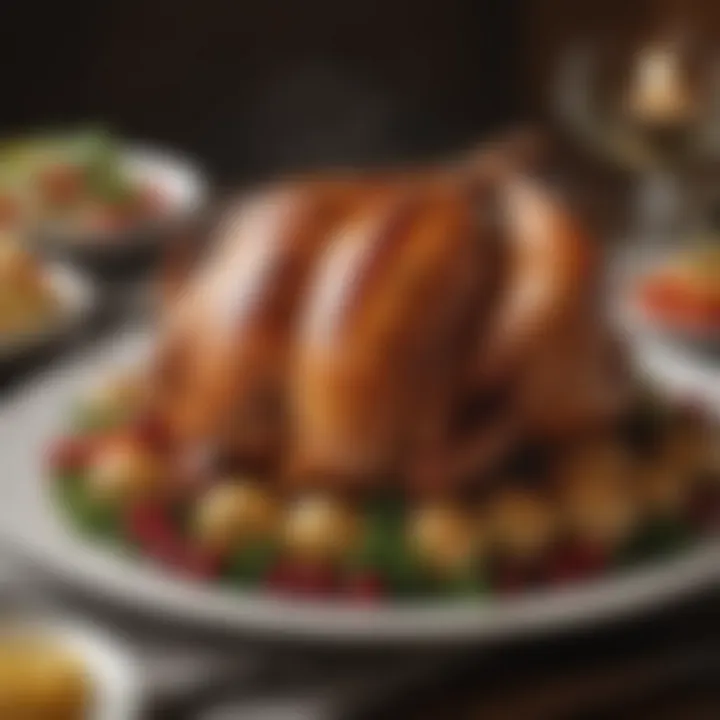
- Variety: Recipes like Classic Herb Brined Turkey and Citrus Marinated Turkey with BBQ Glaze help cater to diverse tastes. Cooks can experiment with the ones they prefer.
- Skill Development: Following recipes enables both novice and experienced cooks to refine their grilling techniques. Learning to brine and marinate effectively can lead to significantly better results.
- Flavor Enhancement: Specific ingredients and cooking methods enhance the flavor of turkey, which can otherwise be bland. This section emphasizes the importance of flavoring and its role in grilling.
- Inspiration: Recipes can spark creativity, encouraging cooks to develop their versions or even create new dishes.
Adhering to a well-structured recipe ensures consistent results, which is essential for those who may be less experienced in grilling.
Classic Herb Brined Turkey
A classic herb brine is essential for juicy and flavorful turkey. This technique involves soaking the turkey in a solution of water, salt, and various herbs for several hours or overnight. The brine penetrates the meat, increasing moisture retention during cooking.
Ingredients
- 1 cup kosher salt
- 1 cup brown sugar
- 1 gallon of water
- Fresh herbs (such as rosemary, thyme, and sage)
- Whole black peppercorns
- Garlic cloves, smashed
Method
- Prepare the Brine: Dissolve salt and brown sugar in water over heat. Add herbs and peppercorns, then cool.
- Brining: Submerge the turkey in the brine, ensuring it's fully covered. Refrigerate for 12-24 hours.
- Rinse and Prepare for Grilling: After brining, rinse the turkey under cold water and pat dry. This removes excess salt and herbs.
- Grill: Proceed to grill according to desired method; indirect grilling is recommended for even cooking.
Using a brine not only elevates the flavor but also helps prevent the meat from drying out during cooking, which is a common concern for many turkey cooks.
Citrus Marinated Turkey with BBQ Glaze
Citrus marinades are another effective way to infuse flavor into grilled turkey. This particular recipe combines the bright flavors of citrus with a rich BBQ glaze, creating a sweet and zesty profile that complements the natural taste of turkey well.
Ingredients
- 1 cup orange juice
- 1/2 cup lime juice
- Zest of 2 oranges
- 1/2 cup olive oil
- 1 tablespoon honey
- BBQ sauce (for glazing)
- Salt and pepper to taste
Method
- Make the Marinade: Combine orange juice, lime juice, zest, olive oil, honey, salt, and pepper in a bowl.
- Marinate: Place the turkey in a resealable bag or dish and pour the marinade over it. Refrigerate for 6-8 hours, or overnight for best results.
- Prepare for Grilling: Remove the turkey from the marinade, letting excess drip off. Apply a layer of BBQ sauce before grilling.
- Grill: Cook the turkey using indirect heat, basting with more BBQ sauce throughout the grilling process.
Marinades like this one add distinct acidity that can brighten flavors and tenderize the meat, resulting in a succulent dish that appeals to many palates.
Culinary Innovations in Turkey Grilling
Culinary innovations have transformed the way we approach grilling turkey. This section examines these fresh ideas and their impact on enhancing flavor, texture, and overall dining experiences. Exploring advancements like sous vide cooking or global flavor incorporation can elevate the traditional turkey grilling concept into an exciting culinary adventure.
Employing innovative methods not only improves the taste but also offers convenience. For instance, sous vide can ensure turkey is perfectly cooked every time, minimizing the risks often associated with traditional grilling methods. Experimenting with diverse flavor profiles allows cooks to personalize their dishes, making grilled turkey meals more vibrant and appealing.
Sous Vide Turkey Before Grilling
Sous vide is a method that involves cooking food slowly in a temperature-controlled water bath. When applied to turkey, sous vide can be a game changer. First, this technique ensures the meat stays juicy and tender. The precise temperature control prevents overcooking, a common issue with turkey. Typically, the turkey is vacuum-sealed with seasonings before being immersed in the water bath.
After a suitable cooking duration, which usually lasts several hours, the turkey is finished on the grill for that signature smoky flavor. This two-step process allows all the flavors to meld beautifully while achieving a perfect crust on the outside.
By using the sous vide method, grillers can manage larger turkeys without worry. The outcome is remarkably flavorful and moist turkey, impressive at any gathering.
Experimenting with Global Flavor Profiles
Diving into global flavor profiles provides a fresh perspective on grilling turkey. Progressive cooks should look beyond traditional herbs and spices. Incorporating diverse ingredients can elevate the taste and intrigue of the dish.
For instance, adopting Asian flavors such as soy sauce, ginger, or sesame oil introduces an unexpected twist. Middle Eastern spices like za'atar or sumac can add depth. Latin influences, including citrus marinades, bring brightness and zest.
It is important to remember that any flavor should be balanced. Too much can overwhelm the turkey, leading to an unappealing result. Aim for a harmony of flavors that enhance rather than mask the natural taste of the meat.
Ending
In this article, we have delved into various aspects of grilling turkey, an endeavor that combines both technique and creativity. The conclusion serves not just as a summary, but also as a reinforcement of the valuable insights gathered throughout the guide. Emphasizing the integration of preparation methods, equipment choices, and cooking techniques elevates the experience of grilling turkey from a mere act of cooking to an art form.
By understanding the essentials, one can avoid common pitfalls. Dry turkey, overcooking, or uneven flavors are among the issues that can arise without proper knowledge. This guide has emphasized methods like brining, marinating, and maintaining temperature control—critical elements that can dictate the success of the dish. The benefits extend beyond taste. Grilling develops a unique character and smoky flavor that is hard to replicate with other cooking methods.
Moreover, the rich variety of recipes provided encourages exploration. One cannot overestimate the importance of experimenting with different flavors and techniques, as this fosters personal growth in cooking abilities. The engagement with global flavor profiles can open a door to a wider culinary landscape, making the grilling experience exciting.
The careful consideration given to serving techniques plays a crucial role in how the final dish is enjoyed. Presentation and serving can enhance the overall experience, turning a simple meal into a memorable occasion.
By embracing these principles, both novice and seasoned cooks can elevate their turkey grilling skills and undertaking to new heights.
Recap of Key Points
The journey accomplished through this article has covered key elements such as:
- Understanding different turkey types and selection criteria.
- Exploring essential grilling equipment and techniques.
- Preparing the turkey through brining and marinating for enhanced flavor.
- Ensuring proper cooking techniques and times for juicy results.
- Addressing common grilling challenges with effective solutions.
- Importance of presentation when serving grilled turkey.
These points not only illuminate also the foundational aspects of grilling turkey but also serve as valuable tips to improve culinary proficiency.
Encouragement to Explore Turkey Grilling
The world of grilling turkey is vast and filled with opportunities for creativity. Each cook has the chance to develop their style and preferences, which can make for a deeply personal experience. Exploring various recipes, experimenting with local ingredients, and trying different grilling techniques can lead to delightful discoveries.
Take initiative to step outside the comfort zone. Whether you are preparing for a holiday feast or a casual weekend gathering, grilling turkey opens doors to culinary exploration. Consider embracing diverse flavor profiles from various cuisines, or innovating your own unique recipes. The joy of grilling lies in both the process and the outcome, inviting cooks to continuously learn and perfect their craft.
Ultimately, engaging with turkey grilling can be both fulfilling and enlightening. Embrace the challenge, and savor the results.







